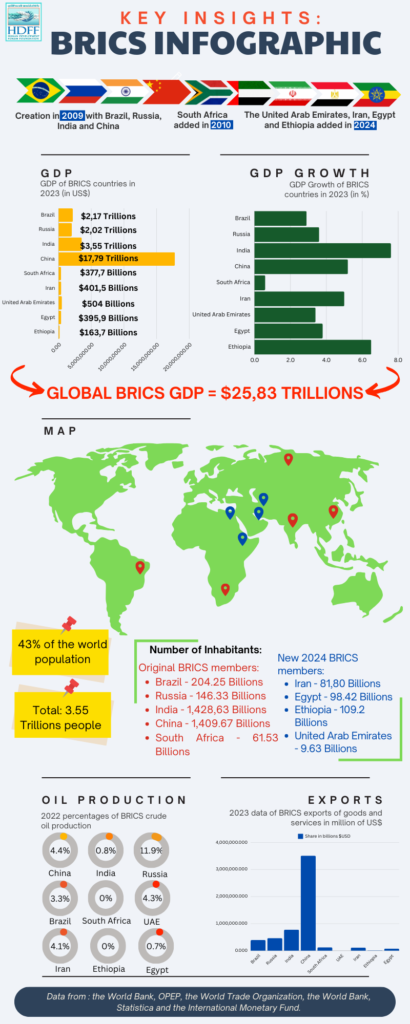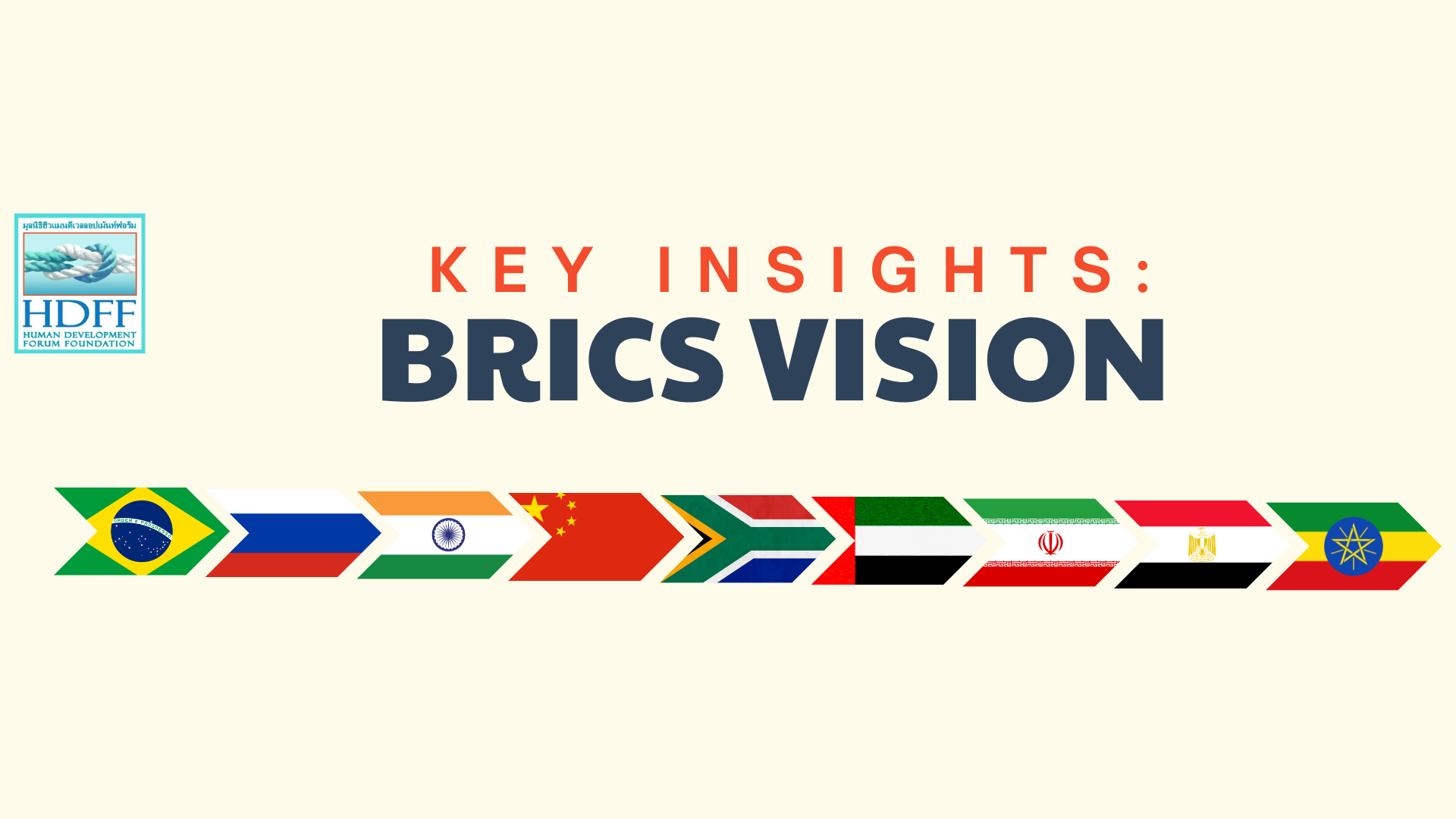BRICS currently represents a population five times larger than the G7 and more than 35% of the global economy. Likewise, BRICS members have experienced some of the highest increases in GDP in the world and are quickly growing. BRICS offers an example of an organization for Global South countries, where their interests are represented and they can find numerous opportunities outside of Western influence. Continued expansion of BRICS membership is proof of its growing global influence. Iran, the United Arab Emirates, Ethiopia, and Egypt have recently joined, and Turkey is at the highest level of discussion regarding its membership. Following the Kazan BRICS Summit, several South-East Asian countries also declared their desire to join the organization.

The BRICS vision
Many countries are looking for stability in global security that the U.S. is not capable of offering. According to economist Richard Wolff, the U.S. is less trusted than they were in the past, and its foreign policy towards the Middle East is in part to blame for this distrust. Another part of this reasoning is the global economic system. BRICS nations feel that the Liberal International Order (LIO) does not work for them and see opportunities for reforms. During the 2024 Kazan Summit, Russian President Vladimir Putin stated that the BRICS would be leading the global economic growth, and is pushing for a “de-dollarized” BRICS. Chinese President Xi Jinping highlighted the potential for cooperation in “sports, education, and the arts” for the different cultures represented within the BRICS to “inspire one another and illuminate the path forward for BRICS”. As the current world order shifts towards multipolarity, BRICS is both pushing and embracing the change. Their main objective is development. BRICS nations seek to emerge from their “underdeveloped” status.
BRICS offers an “in-between” platform for old enemies to find common ground. The day before the Summit’s opening, India and the People’s Republic of China announced an agreement over border disputes after many years of disagreement and conflict over the issue. BRICS was envisioned to create the opportunity for Global South isolated countries to create alliances.
Despite attracting new hopeful members, many nations are cautious that their membership may antagonize the West. Non-West countries’ dependence on the West is still very high despite the rising importance of South-South cooperation. In Africa and Latin America, left-leaning governments have shown their interest in the BRICS organization. On the other hand, right-leaning, conservative governments often fear that membership may be perceived as an affront to the West. One of the challenges facing BRICS is to adapt to the future types of government their new members will introduce. Given BRICS’ ambitious goals, the organization must navigate its structural mechanisms with caution to ensure effective collaboration.
Are BRICS a real challenge for the current US-led world order?
According to economist Richard Wolff, the G7 countries are “trying to hold on to a position that is no longer theirs” claiming that “the current situation in the Middle East is proof of the U.S. decline”, their unwavering support to Israel and the constant EU support of U.S. foreign policy is weakening and isolating the West. The PRC’s and Russia’s presidents have both expressed their disapproval of Israel’s genocide in Gaza during the 2024 BRICS Summit. The West’s hypocrisy regarding the sanctions over the war in Ukraine and their unwavering support for the genocide in Gaza has not gone unnoticed either. The perceived inefficiency of the UN and the ongoing paralysis within the Security Council are intensifying feelings of Western isolation among BRICS members and potential future BRICS+ members.
The promise of a stable financial system that can’t be disturbed by foreign interference or sanctions, and the goal to develop trade with national currencies without relying on the US dollar, make the economic appeal of joining BRICS very high. This objective is the embodiment of the will for Global South countries to distance the U.S.-led LIO in favor of a multipolar world where the U.S. does not have its influence over everything. For states sharing similar sanctions from the West, BRICS offers a platform to find solutions to common problems, and this objective of a new financial system interests them.
Global South countries are gaining power and reclaiming their voices on the international stage, but it needs to be nuanced. Countries are increasingly asking to join the organization but at the same time, others are refusing because they fear the PRC’s hegemony. BRICS also faces challenges both internally as a bloc and within the member states’ governments. Regional conflicts and border issues are the two main divisions within the bloc. Despite presenting the Kazan Declaration as one voice, BRICS is not able yet to act as a cohesive counterbalance in these areas.
The image projected within individual members’ domestic media provides a different image than the Kazan Declaration does. In South Africa, the BRICS are presented as a platform, and in the PRC, the discourse is set around their ties and the importance of BRICS for the new world order. Due to these challenges, BRICS is not yet the global power it strives to be. However, they have made consistent progress towards integration and expansion.
Conclusion
BRICS has yet to present the challenge to the US-led global order that it aspires to be. The image projected of the BRICS is one of positivity, alliances, and commitment to the principles of the UN Charter. However, their domestic situations cannot be ignored, especially with the PRC’s recurrent human rights violations and the current sanctions on Russia. Their growing economic power, calls for multipolarity, and ambitions to reform global institutions signal their desire for greater influence. Nevertheless, internal divisions, economic disparities, and differing political agendas limit the Member States’ abilities to act as a unified counterbalance to the current US-led world order. Moreover, while BRICS may provide an alternative vision of global governance, they are not seeking a complete overthrow of the current system, rather, they are looking to reform. Therefore, the bloc’s influence represents more a continuation of global cooperation within a changing framework than a shift in the international power balance.
Sources:
http://en.kremlin.ru/events/president/news/75359
https://www.economicsobservatory.com/the-brics-countries-where-next-and-what-impact-on-the-global-economyInterview of economist Richard Wolffe https://www.youtube.com/watch?v=FwOXoLlq0l8
Interview of economist Richard Wolffe https://www.youtube.com/watch?v=FwOXoLlq0l8


Comments are closed